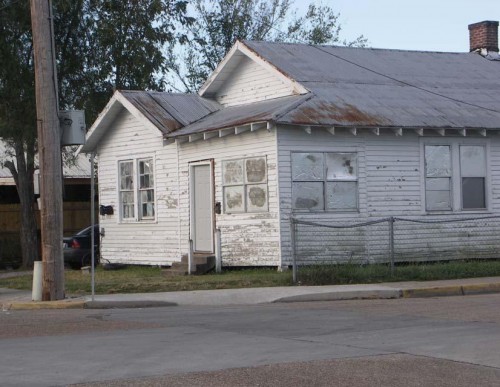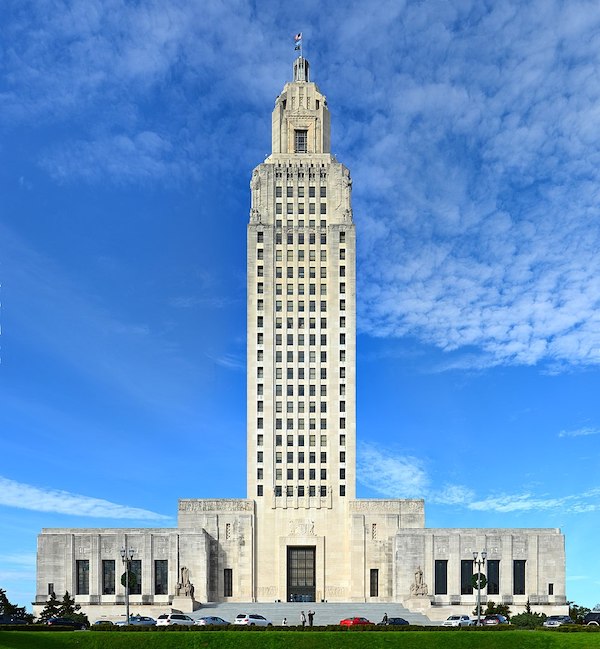Tuesday, Nov. 16
November 16, 2010
Neighbors angered over blight
November 18, 2010In a speech that was more like a tent revival than military briefing, or business meeting, retired U.S. Army Gen. Russel Honore admonished approximately 60 listeners to appreciate the freedom provided by veterans and understand that keeping those freedoms in the future will require every citizen to make minor sacrifices in order to insure the survival of others in less privileged areas n as well as their own continued existence as free people.
Honore, who is best known in Louisiana for his role in post-Katrina rescue and recovery work, has in recent years focused his efforts on helping the people in earthquake-ravaged Haiti.
The retired general spoke on “Leadership in the 21st Century” for local business and civic leaders who came out on a rainy evening to the Woodmen of the World Hall to hear him proclaim, “We need to remember that we are Americans; the most powerful nation in the world. And right now we are in the process of bringing freedom to a few more nations of the world.”
Honore recalled stories of history including George Washington and his troops at Valley Forge, the trials of soldiers in World War I and the victories claimed by veterans of World War II.
“The lessons I learned [were traits] that Washington possessed. Number one, Washington learned to do the routine things well. The second characteristic I like about Washington was that he wasn’t afraid to take on the impossible. The third lesson I like, that is very characteristic of Washington, is [to not] be afraid to act even if you are being criticized.”
Honore noted that while there are some ideologies that American’s will never agree with n citing the Taliban in Afghanistan n but stressed that the one certainty is that when Americans help fight poverty in third-world areas, the citizens of those countries will ultimately see democracy as the answer to their ills.
Honore thanked members of the local Rotary Club for work they have performed to drill wells so as to provide fresh water to the people of Jeremie, a small village about 100 miles west of Port-au-Prince. He said there is more work to do not only in Haiti, but in other parts of the world as well.
“Our biggest enemy [of the future] won’t be the 1.3 million men of the Chinese Army. It will be internally,” Honore said. He called on listeners to understand that the current social war in America is one of culturally changing the country so all citizens will value education, productive work and to others at a higher level than their own desires demand.
“Why do we want to go help a little country like Haiti?” Honore asked his audience.
“We have about 6.4 billion people in the world today. Ten years ago we had about 4.8 billion. Ten years from now that will be about 10.8 billion. In the United States we have about 309 million that we know about,” he said.
The speaker noted that while Americans represent about 5 percent of the world’s population but consume 25 percent of the world’s resources. Because of that, he stressed, the U.S. should be expected to do more because of the abundance they possess in comparison to economically and health-challenged parts of the world.
A PowerPoint presentation was shown as Honore told his listeners how they have so much going for them in contrast to people living in poverty n but that those people are glad to have the most modest of resources to sustain life.
Honore noted in that story that one well provided water for an entire village and how that stands in contrast to Americans taking for granted the availability of running water in their own homes. “We’re talking about putting water in a village, not in a house,” he said.
“The earthquake [in Haiti] uncovered a situation that the world should be ashamed of. That in the Western Hemisphere we got people walking with gallon jugs, two to three miles to get clean water when all they need is a water well in their own village,” Honore said.
Honore noted that U.S. forces are on stand-by in Haiti to prevent a mass migration from Haiti to the U.S. and suggested it is because the people of that Island nation know what they have in contrast to the prosperity only 681 miles away in cities of abundance like Miami.
“Each American generation must value the price of freedom,” he said. “When the time comes for you young man, you must remember, and you, that you were born free by accident, you live free as a privilege and you die free as a responsibility.”
Honore said that Americans have historically made sacrifices for the benefits of others and called on his listeners to know that now is a time to help struggling democracies not only for their benefit but for the continued legacy of America and freedoms enjoyed in the United States.
“We can make a difference without breaking our back,” he said.
“We got people in this room that actually go down and drill that well. They are making it happen. These are the ways we are going to win wars of the future. Future wars will not be won by armies of war. Future wars will be won by making sure people have access to clean water. Future wars will mean preventing that war by being innovative and creating technology where you can put a well in every city. The challenge is how you will take those challenges and make them reality so people can have what we have,” Honore said.
The night ended with Honore signing books and attendee offering donations to the Rotarians’ work.









